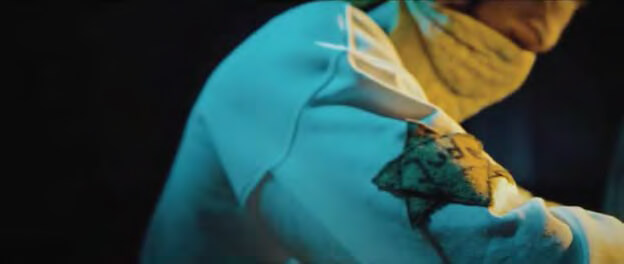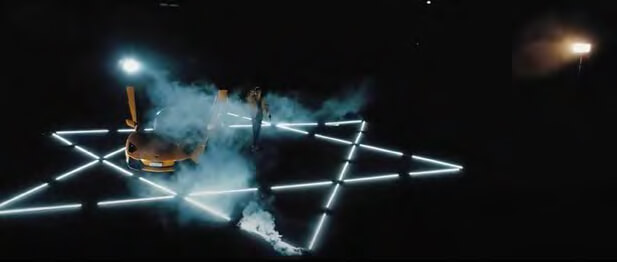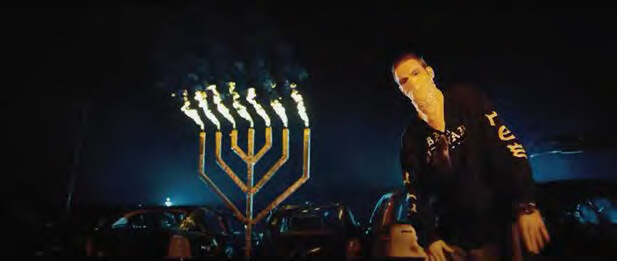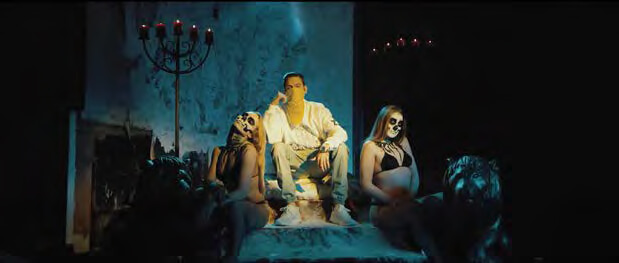Above: Detail from Siona Benjamin. Finding Home #75 (Fereshteh) “Lilith,” 2005. 30 x 26 in. Gouache on wood panel. © 2005 Siona Benjamin. Courtesy of the artist.
| Linke Hand die Tora | Left hand Torah, |
| Rechte Hand die Neuner, yeah | Right hand nine millimeters, yeah |
| Rapper sind nur Träumer, yeah | Rappers are just dreamers, yeah |
| Will in’ Himmel zu Eloah | I want into heaven to Eloah |
| Ein Yahudi, der haram vertickt | One Yahudi, that is ticking haram |
| Mit der Araber-Clique, Marihuana-Traffic | With an Arab-clique, marijuana-traffic |
Part 1 of the song “Eloah” by Sun Diego (author’s translation)
These lyrics from the German Jewish rapper Sun Diego’s song “Eloah” seem unsettling. On the one hand, he raps about his criminal and violent lifestyle as a drug dealer and implies that he is connected to organized crime. On the other hand, he describes himself as a Jew (Yahudi), and mentions the Torah as well as his religious ambitions to meet Eloah in heaven. He invokes gangsta rap and criminal lifestyle here and Jewish identity and religion there, two motifs that seem to belong to two completely different worlds.
Combining typical gangsta-rap themes with Jewish symbols seems to be Sun Diego’s signature style. In the music video for his song “Yellow Bar Mitzvah,” Sun Diego, a.k.a. SpongeBozz, surrounds himself with scantily clad women, sports cars, drugs, and jewelry—in other words, common gangsta-rap motifs. In the same clip, he wears a yellow cloth star saying “Jude,” poses in front of a giant menorah, and dances inside a large Star of David constructed out of neon tubes.

Scene from the music video “Yellow Bar Mitzvah” by SpongeBozz

Scene from the music video “Yellow Bar Mitzvah” by SpongeBozz
When he was questioned in an interview on the meaning of the Jewish symbols in his songs, Sun Diego referred to rap as an “entertainment business.” To be successful in this business one has to market one’s own identity—where his identity is constituted by a combination of criminal lifestyle and Judaism. “We are in the entertainment business. Nowadays people use their religious symbolism, their roots, their identity. It’s normal, other rappers do it the same way. Except they’re not Jewish. … It’s kind of like a game.“iv
. . . his use of Jewish symbols in German rap cannot (and must not) be reduced to marketing: his raps exceed his own, nonpolitical intentions.
In Sun Diego’s own interpretation, he uses Jewish symbols to market his own identity and to generate attention. By deviating from the norms of German society he generates more attention.v If some listeners perceive this deviation as an antisocial act of provocation—as some comments under his videos, his social media posts, and in rap-forums suggest—this might generate even more attention. In the end, in Sun Diego’s own words, it all comes down to generating sales.
Although Sun Diego denies any political intentions, his use of Jewish symbols in German rap cannot (and must not) be reduced to marketing: his raps exceed his own, nonpolitical intentions.

Scene from the music video “Yellow Bar Mitzvah” by SpongeBozz
It is the social norm itself, its moral illegitimacy, as well as the fact that it arbitrarily restricts the freedom of expression of a large population group, that makes Sun Diego’s deviance from it more than a nonpolitical or even antisocial act of pure self-marketing. His use of Jewish symbols and his expression of his Jewish identity in ways and formats not specifically reserved for it are instead to be understood as a political act of self-emancipation. It shows that there is nothing morally “wrong” with expressing one’s Jewish identity—neither in rap nor in society—but that the norm itself is illegitimate. However, this in turn has political consequences for three different groups.
First, for his non-Jewish listeners, his rap raises awareness of the relative lack of Jewish artists both in gangsta rap and other “non-Jewish” formats and might lead them to the realization that Jewish expressions in German society are limited to very few topics, perspectives, and formats. He makes visible to them the societal norm that restricts Jewish expression and whose existence they were either unaware of or ignored until now.
Second, for his fellow Jews in Germany, his self-emancipation as a Jewish German gangsta rapper proves that they do not have to limit themselves to certain expressions in order to meet norms expected of them. Sun Diego might become an example of Jewish disintegrationvi and encourage them to freely express and emancipate themselves.
Third, for German society as a whole, his rap turns out to be a confrontation with Jewish identity and Jewish symbols in unexpected ways. This forces society into a learning process in the course of which it will (hopefully) get to know and learn to accept Jewish Otherness—and contributes to overcoming this illegitimate social norm in the long term.
Its emancipative potential as well as its political consequences proves Sun Diego’s Jewish German gangsta rap as a (possibly unconscious) subtle form of Jewish protest.

Scene from the music video “Yellow Bar Mitzvah” by SpongeBozz
This example shows that protest does not always appear in typical forms. It may be as unexpected as bringing Jewish symbols into German rap and performing as a Judenrapper (Jewish rapper).vii And sometimes the protest is not even intended as a protest.
Such subtle acts of Jewish protest can be found wherever people/artists assert their Jewish identity or draw inspiration from it in a foreign and possibly hostile context. Due to their subtlety (and possibly unintentionality), such acts are often not considered a protest. At this point, the task of the academic community is to sharpen their own senses in order to perceive such subtle forms of protest in various forms and in various unexpected places.

MAX TRETTER is a Protestant theologian and a research assistant in the Department of Systematic Theology at Friedrich-Alexander-University Erlangen-Nuremberg. His research focuses on the ethics of digitalization, art and culture in the political public sphere, and the relation between hip hop, religion, and politics. His most recent publication is “By All Memes Necessary: Hip Hop, Memes, and the Internet,” (PopMeC Research Blog, May 4, 2021).
i An overview of antisemitism and German rap is provided by Marcus Staiger, “Antisemitismus im deutschen Rap,” Aus Politik und Zeitgeschichte 68, no. 9 (2018): 40–45.
ii One might mention other German Jewish rappers, e.g., Ben Salomo, who explicitly raps about his Jewish identity and his struggles as a Jew in Germany. But like Sun Diego, Ben Salomo is an exception— and often discusses his experiences as an outsider. Cf. Ben Salomo, Ben Salomo bedeutet Sohn des Friedens (Munich: Europa Verlag GmbH, 2019).
iii Cf. Max Czollek, Desintegriert euch! (Munich: Veltman Distributie Import Books, 2018).
iv Dmitrij Kapitelman, “ Ich Bin Halt ein Judenrapper, mein Gott,” Der Spiegel, November 3, 2018 (author’s translation).
v David Schraven, and Finn Schraven, “Yellow Bar Mitzvah: Sun Diego über Rap und Rapper,” Correctiv!, February 28, 2018.
vii Cf. Czollek, Desintegriert euch!
vii A term used by Sun Diego to describe himself, cf. Kapitelman”Ich Bin Halt ein Judenrapper.”